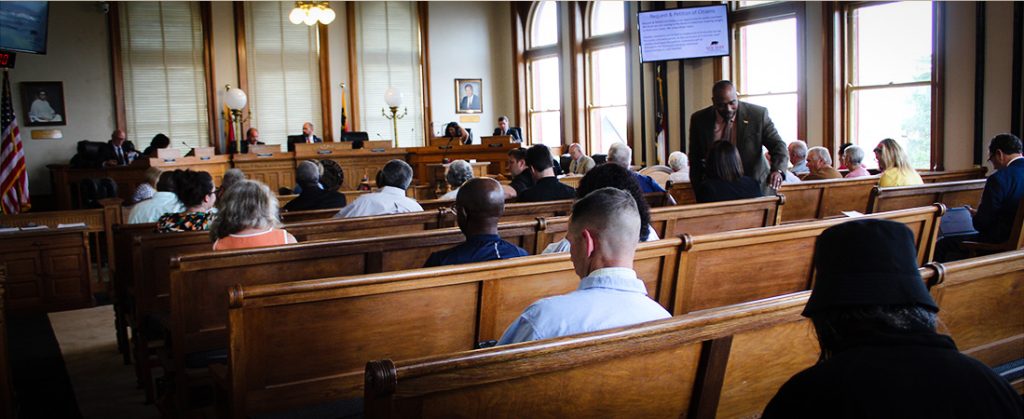
New Bern residents could see changes in city property taxes as well as water and sewer rates under a proposed city budget presented to the board of aldermen last week.
During the March 9 presentation, City Manager Foster Hughes explained that the city’s total fiscal year 2023-24 budget request will be $149,449,202, a 6.8% increase from last year’s adopted budget of $139,940,032. The city’s general fund expenses would increase $6.6 million from the 2023 budget to $49,108,097.
Hughes said the budget increases were due to both inflation and additional salary benefits for city employees that were authorized in late 2022, including the $2.4 million implementation of a salary study. The city is also recommending a cost of living adjustment for employees of 3% and merit increases up to 2%.
Hughes said other impacts were felt from an increase in health insurance costs of 11%, and salaries for two new proposed positions in the Human Resources and Public Works departments.
The proposed 2023 budget recommends lowering the city’s ad valorem property tax rate from 48.22 cents per $100 to 41.59 cents per $100. As an example of the impact of the proposed change, a city property assessed at $100,000 would pay $482.20 under the current rate and $415.90 under the lower rate. A property assessed at $200,000 would pay $964.40 under the current rate and $831.80 under the proposed rate.
The budget also recommends lowering the tax rate for the city’s Municipal Service District from .1375 per $100 to a revenue neutral tax rate of .1122 per $100.
New Bern’s Municipal Service District encompasses most of the city’s downtown area. In addition to city and county property taxes, property owners within the MSD pay an additional tax that goes toward improvements in the area. The MSD tax brings in an average of $195,000 annually under the current rate.
Discussing the potential impacts of the proposed budget, Hughes said New Bern residents would likely see higher water and sewer rates due to “increases in operational costs that are outpacing revenue growth and also capital projects.”
There will also be an increase in solid waste rates, Hughes said, due to an expected change in the city’s contract with GFL Environmental Inc. and a rise in landfill tipping fees.
A public hearing on the City of New Bern’s proposed FY 2023-24 budget will be held during the board of aldermen’s May 23 meeting. Hughes said he expected to present the budget for adoption on June 13.
A copy of the proposed City of New Bern budget is on file at the city clerk’s office and the New Bern-Craven County Public Library and is available on the City of New Bern website, https://www.newbernnc.gov/departments/administration/finance/annual_budget_and_reports.php#outer-637
Budget highlights includes street repairs, new fire truck
The proposed general fund expenses for the 2023-24 budget break down as:
-Fire Department Budget-$9.2 million (increase of $1.7 million)
-Police Department-14,377,460 (increase of $1.3 million)
-Parks and Recreation-$3.8 million (decrease of $74,876)
-Development Services-$2.7 million (increase of $907,995)
-Public Works-$8.7 million (increase of $1.9 million)
-Debt Service-$2.9 million (increase of $530,000)
-General Government (administration, governing board, technology, etc.) -$4.1 million (decrease of $101,496)
-Finance-$1.9 million (increase of $122,021)
-Human Resources-$960,861 (increase of $156,953)
The proposed budget recommends the replacement of one fire truck and refurbishment of two other fire trucks. Ten new vehicles are also proposed for the police department.
The Public Works budget includes $600,000 to resurface and repair streets within the city. Sidewalk improvements in the amount of $50,000 are also included in the budget as well as water and sewer line expansions.
The budget forecasts challenges for fiscal year 2023-24 that include financing electric system improvements estimated in the range of $20 million for a substation.
“This project will provide room for future growth of our system and accommodate future residential and commercial growth for years to come,” the budget states, “as well as minimize redundancy and an annual power supply gross cost avoidance of approximately $4.8 million per year.”
By Todd Wetherington, co-editor. Send an email with questions or comments.

